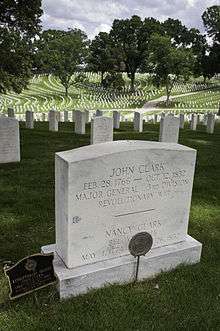John Clark (Georgia governor)
| John Clark | |
|---|---|
 | |
| Born | February 28, 1766 |
| Died | October 12, 1832 (aged 66) |
| Occupation | Planter, politician |
| Relatives | Edward Clark (nephew) |
John Clark (sometimes spelled Clarke) (February 28, 1766 – October 12, 1832) was an American planter and politician.
Early life
John Clark was born on February 28, 1766 in Edgecombe County, North Carolina. Along with his father, Elijah Clarke, Clark fought in the Revolutionary War at the Battle of Kettle Creek. He moved to Wilkes County, Georgia in the early 1770s.
Career

Clark served in the Georgia House of Representatives prior to being elected to consecutive two-year terms as the 31st Governor from 1819 to 1824. Clark also served in the Georgia Militia during the American Revolution and achieved the rank of Major General in 1796. While governor of Georgia he was involved in the U.S. Supreme Court case known as Ex parte Madrazzo.
Personal life
Clark resided at Woodville, a Southern plantation in Milledgeville, Georgia]].[1]
Death and legacy
Clark died of yellow fever in St. Andrews Bay (Florida) in what was then Washington County (currently Bay County) and was buried in that same city; however, his grave was relocated to Marietta National Cemetery[2] in Georgia in 1923 by the Daughters of the American Revolution.
Clarke County, Alabama is named after him.[3]
References
- ↑ "National Register of Historic Places Inventory--Nomination Form: Westover, or Clark-Bentley House". National Park Service. Retrieved January 7, 2016.
- ↑ John Clark at Find a Grave
- ↑ "Clarke County: A Brief History". Clarke County Historical Museum. Retrieved 3 January 2009.
Bibliography
- "John Clark (1766-1832)," New Georgia Encyclopedia.
- Georgia State Archives Roster of State Governors
- Georgia Governor's Gravesites Field Guide (1776-2003)
- Georgia Secretary of State official website
- John Clark House historical marker
External Links
- Troup-Clarke Political Feud historical marker
| Political offices | ||
|---|---|---|
| Preceded by Matthew Talbot |
Governor of Georgia 1819–1824 |
Succeeded by George Troup |
